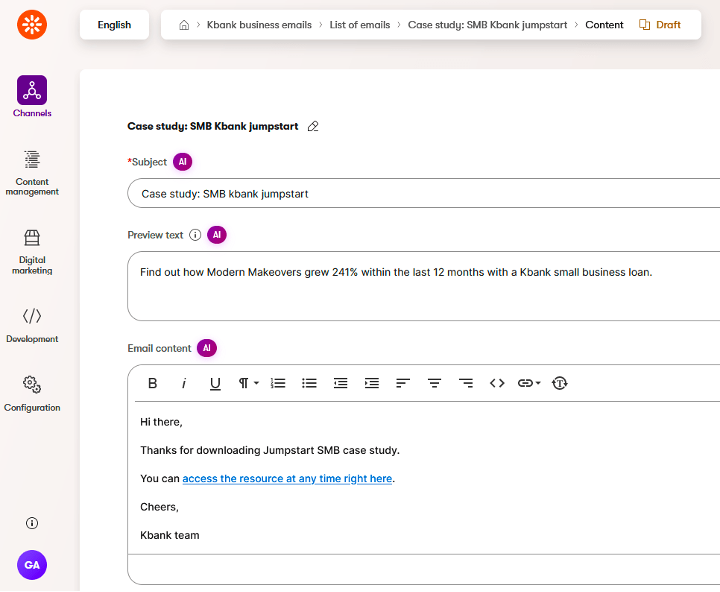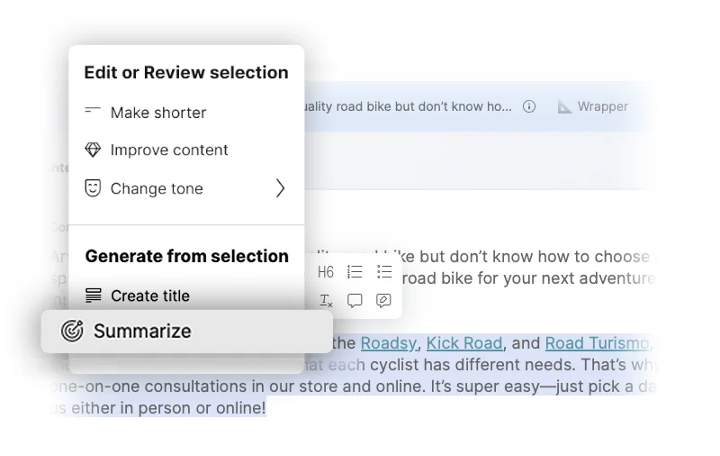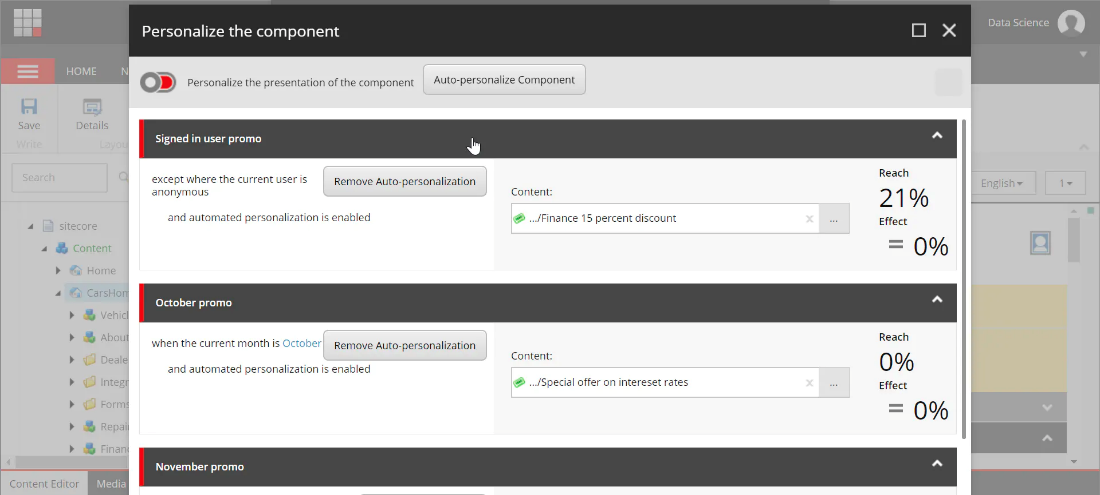Artificial Intelligence In CMS - State Of The Market
The integration of Artificial Intelligence (AI) into our daily lives is inevitable, and CMS systems are no exception. As AI continues to evolve, its role in CMS is becoming significant, though its exact impact and implementation remain uncertain.
In this article, we won't speculate on our own. Instead, we'll explore the plans of businesses involved in this field.

We've researched various CMS vendors to understand what they currently offer and their future AI-related plans. Initially, we wanted to cover who's leading and who's lagging in this area. But we've learned it's not as straightforward as it seems:
- Should the focus be on developing features that delight editors, or on addressing privacy and security concerns?
- Shall the features be based on current language model versions and capabilities or is it better to wait for the next version to avoid dead-end roads of product evolution?
We don't have all the answers, and we'll leave it to the market to determine the best course. But before we get there, let's dive into the insights we've gathered.
What are the numbers saying
Grasping the significance of AI requires looking at the bigger picture. Here's a glance at the global AI market's statistics and the companies emphasizing this technology.
Currently valued at nearly 100 billion U.S. dollars, the AI market is projected to surge to 2 trillion by 2030.

According to Statista, more than 80% of industry experts already integrate some form of AI technology in their online marketing activities.
The growth forecast and current applications underscore AI's growing importance and the urgency for businesses to adopt and integrate AI technologies into their strategies.
AI Integration in Leading CMS Platforms
We've reached out to CMS vendors we are in touch with to explore how they incorporate AI into their systems, and here's what we discovered.
Kentico
A versatile digital experience platform, merging headless CMS flexibility with comprehensive content management and marketing tools. It's recognized for its cost-efficiency and ease of implementation, ideal for personalized, multichannel digital strategies.
AI Feature Highlights for Content Creators:
- AI Email writer
- AI Image Recognition
Kentico relies on advanced AI integrations and emphasizes efficiency and creativity in content creation. The platform, through Xperience by Kentico, offers an integration with Azure OpenAI Service using the Chat GPT (GPT-3.5) model. This allows users to generate draft text for marketing emails, including subjects and bodies, by repurposing existing content and aligning it with the brand's tone of voice.

Additionally, Kentico's content hub acts as a centralized repository, where AI tools can summarize articles for campaigns, streamlining content repurposing. AI Image recognition is also employed for generating alt text in the rich text editor, where images are analyzed using Azure Cognitive Services for accurate description.
In terms of privacy and security, Kentico's approach incorporates the business tier of OpenAI models, ensuring responsible and secure use of AI capabilities in content creation.
Kontent.ai
An advanced headless CMS that optimizes content management and delivery. It emphasizes an API-first, cloud-native approach, with AI-enhanced collaboration for effective, multi-platform content strategies.
AI Feature Highlights for Content Creators:
- Major focus on confidentiality, privacy, and security
- AI-powered tools for content evaluation and management
- AI-Powered assistant in rich text
Kontent.ai relies on its pioneering fully native AI capabilities for content authoring and has put emphasis on simplifying and enhancing the content creation process. Within its rich text editor, users can utilize AI skills to efficiently summarize text, shorten it, craft suitable titles, or adapt the text's voice and tone, all seamlessly integrated within Kontent.ai.

Kontent.ai recognizes that as we progress, AI's role in content generation will only grow, leading to an inevitable surge in content production. The real test for businesses will be in effectively managing and controlling these AI-generated outputs.
To address this, Kontent.ai extends its capabilities over the full content life cycle. It integrates a set of governance tools into its system, ensuring that content editors are supported not just in creation but also in the crucial tasks of evaluating and managing content. By providing a holistic solution that covers every aspect of the content lifecycle, from its inception to governance, Kontent.ai sets itself apart from other CMS vendors.
In terms of privacy and security, their solution is powered by Microsoft Azure Open AI services, using a dedicated AI model instance. This setup ensures high confidentiality, security, and full GDPR compliance, simplifying usage without the need for extra credentials or developer support.
Storyblok
Combines a headless CMS with intuitive visual editing, tailored for modern web development. It offers a component-based approach for dynamic content layouts, ensuring seamless content delivery across various channels.
AI Feature Highlights for Content Creators:
- AI-connected features to be released in 2024
- Currently, they offer several features in collaboration with one of their partners
Storyblok relies on its strategic AI integrations and emphasizes enhancing content creation and management. The company is gearing up to unveil new AI-connected features in 2024, but even now, Storyblok presented a suite of innovative capabilities that was built in collaboration with one of their partners.
These include the AI Metadata Companion, which automates the scanning of assets and pages for meta information extraction and updates, while also optimizing image focus points for improved SEO (Search Engine Optimization) and accessibility.
Integrated within Storyblok, ChatGPT enables users to generate and refine content, ensuring automatic formatting and visibility in the platform's live preview. Additionally, DALL-E allows for the creation of custom images based on text descriptions, with these images being stored in the Storyblok Asset Manager for easy reuse.
Throughout these developments, Storyblok maintains a strong commitment to data privacy and the security of its AI integrations.
Sitecore
A digital experience platform combining content management, personalization, and multichannel marketing. Known for its scalability and flexibility, it enables enterprises to create personalized customer experiences across various digital channels.
AI Feature Highlights for Content Creators:
- Advanced AI for content personalization
- Image Similarity for content repurposing
- Automated content tagging
Sitecore relies on its partnership with Microsoft and AI integration across its DXP.
According to Simon Putzer, Area Vice President of Central and Eastern Europe at Sitecore - “The benefits of AI are all in integration, not only in the CMS. CMS is one of the entry points to Sitecore's DXP - Content Hub, Order Cloud (ecommerce), and analytics. AI can help use the data to provide hyper-personalized experience and relevant business insights.”
Sitecore's AI capabilities extend to analyzing big data for predictive marketing, proposing specific campaigns, and understanding client behavior. Their partnership with Microsoft grants them special access to advanced AI technology, making their models rapidly adaptable and insightful. Ultimately, AI enables the analysis of customer data that was previously beyond comprehension.

Simon believes AI in CMS is a game-changer, because the models are learning so fast. However, if everyone adopts the same approach, it may not lead to significant change.
“We see concentration of power... Only if you use the big tech (like Microsoft) you can achieve much,” - adds Simon.
What’s in it for CMS users?
AI in CMS platforms offers multiple benefits for content creators, enhancing content creation and management processes. These advantages align with the common goal of simplifying content operations:
- Streamlined Content Creation: AI tools like Kentico's Email Writer transform hours of writing into mere minutes of tweaking, acting as intuitive assistants.
- Personalization: Platforms like Sitecore analyze audience preferences, enabling tailored content that resonates deeply and saves time on data analysis.
- Accessibility: AI automatically generates alt text for images, broadening audience reach and streamlining workflows, especially on ecommerce websites with many SKUs.
- Data-Driven Insights: AI analyzes user interactions, providing a clear guidance on content strategy, eliminating guesswork.
- Efficient Content Organization: AI assists in categorizing and tagging content efficiently, simplifying management.
In essence, AI in CMS is like having a multifaceted team member, enhancing content creation from draft to delivery, while ensuring it's engaging, accessible, and compliant.
The approaches vary, but the goal is the same
The current landscape in content management systems (CMS) reveals a market grappling with uncertainty, as companies hypothesize and experiment with AI integration. This exploration is a response to a common challenge faced by content creators: the need for efficient, personalized content that resonates with diverse audiences.
Platforms like Kentico, Kontent.ai, Storyblok, and Sitecore are each experimenting with AI in ways they believe will be most effective. Whether it's through enhancing existing features or pioneering new ones, they're all contributing to a broader understanding of AI's potential in CMS.
_________
Do you want to learn more about CMS technologies? At ACTUM Digital, we can significantly simplify your platform selection processes with our expert services. Contact us if you need help with vendor selection and implementation processes for optimal results and faster time-to-market.
Author

Adam Böhm
Division Director at ACTUM Digital. You can find me on LinkedIn
You may also like...
[20/10/2023] Cost Drivers for B2B Web Solutions | CMS Project Breakdown
Discover the cost drivers for B2B web solutions and the factors affecting CMS project prices. In the article, we share insights into CMS price ranges and budget considerations.
[30/06/2023] The Importance of Content Strategy for Digital Marketing Success
Content strategy is an important digital marketing method for manufacturers in 2023. Find out why this strategy is compulsory and how to set up an effective content operations system for your brand.
Read the Insight[27/03/2023] CMS: Skip comparing features and create user scenarios instead
Choose a CMS based on how well it meets the tasks and requirements of your most relevant user scenarios...
Read the Insight